Centres of Excellence
Centres of Excellence (COE)
The Centres of Excellence (COE) reflect Doon’s commitment to interdisciplinary learning, critical thinking and creativity. At present, there are seven Centres of Excellence, each tailored to meet the evolving educational needs of our students. They offer world-class training programmes, mentorship opportunities, and experiential learning designed to equip Doscos with the knowledge, confidence, and global perspective required to thrive in higher education and beyond.
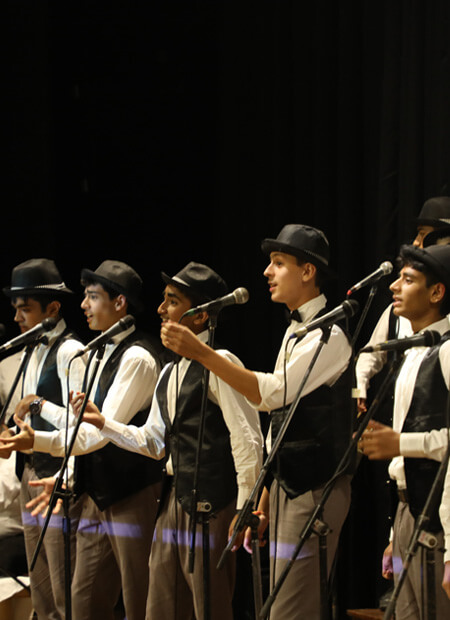
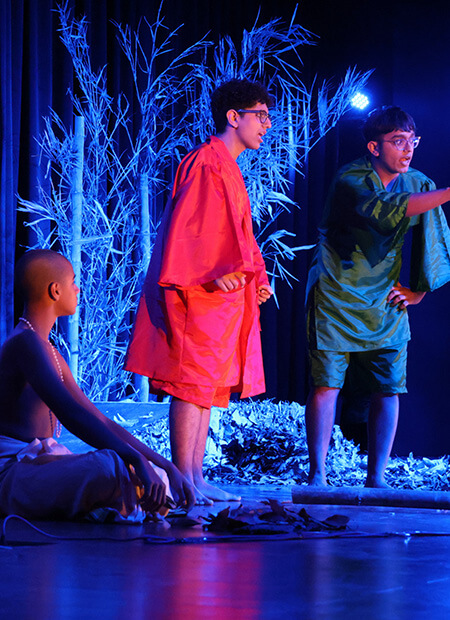
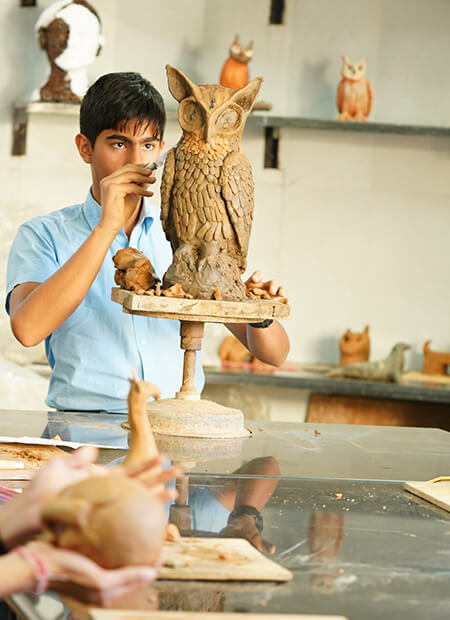
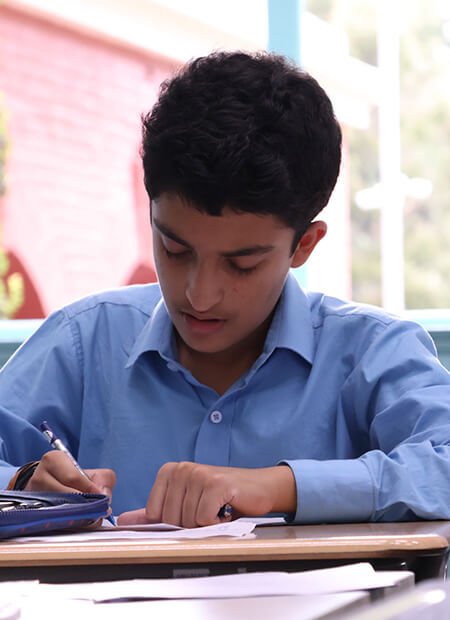
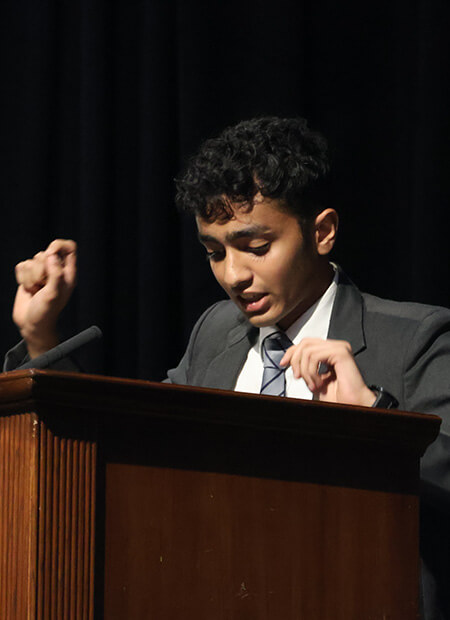
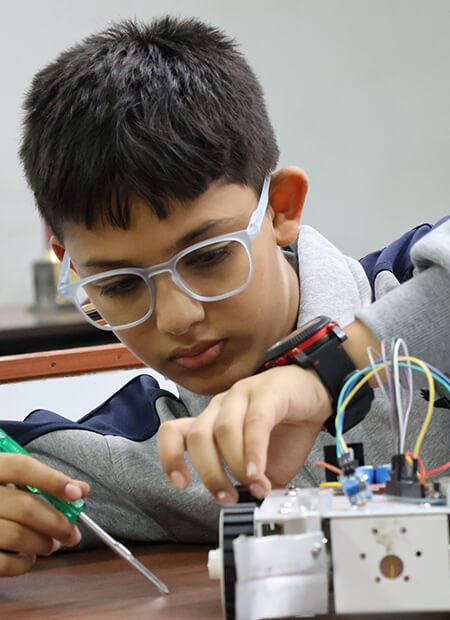
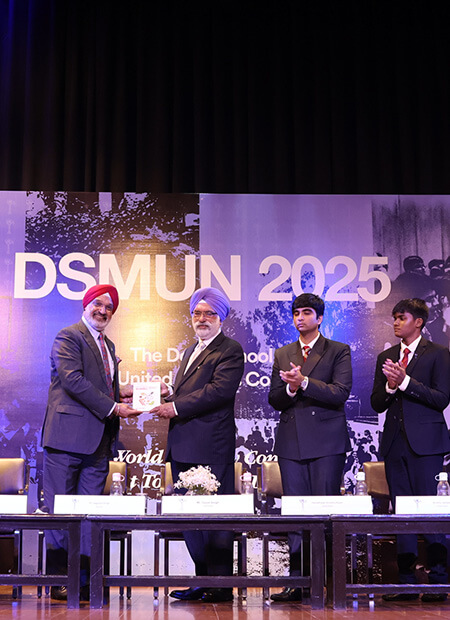
The Centre of Excellence for Theatre aims to create a dedicated theatre space, develop a comprehensive curriculum and offer specialised mentorship and year-round engagement with theatre.
Key Components:
- Artist-in-Residence Program: Professionals working on-site, offering workshops, open sessions, and mentorship.
- Dedicated Infrastructure: A well-equipped theatre facility with modern lighting and sound, rehearsal rooms, and a resource library.
- Program Structure: A year-long curriculum offering modules on acting, direction, scriptwriting, production, and stagecraft as well as regular masterclasses by visiting professionals.
- Engagement: Regular productions and collaboration with other schools and theatre groups for competitions and joint performances.
- Evaluation: Regular assessment of program impact on students’ skills, confidence, and interest in theatre.
The Centre of Excellence for PSD aims to position debating and public speaking more deeply into the school’s co-curricular and main academic programme.
Key Components:
- Artist-in-Residence Program: Professionals working on-site, offering workshops, open sessions, and mentorship.
- Curriculum Integration: Public speaking modules introduced in D and C forms, on par with art and music.
- Confidence Building: Focused exercises and feedback to help students overcome hesitation, develop articulation, and undertake reflection exercises.
- Mentorship & Coaching: Collaboration with university debaters who can offer structured feedback and evaluation to school debaters.
- Jabbing League: Weekly informal debates with local schools, designed to foster camaraderie and competitive spirit.
- Recognition & Incentives: Debating achievements linked with inter-house competition points to motivate broader participation.
The Art CoE reimagines the school’s already rich artistic culture into a space of creativity, critique, and collaboration.
Key Components:
- Artist-in-Residence Program: Professional artists working on-site, offering workshops, open studio sessions, and mentorship.
- MAP Partnership: Collaboration with the Museum of Art and Photography (MAP) for internships, access to digital resources, and field trips.
- Interdisciplinary Projects: Art integrated with science, technology, and languages—for example, exploring AI in art.
- Student-Led Vision: Initial roadmap developed with recent alumni and student voices to ensure relevance and resonance.
- Enrichment Visits: Guided tours to biennales, artist studios, and art fairs.
- Expanded Archive: Upgraded library and digital access to global art education content.
This initiative operates as one in spirit and intent. It is designed to nurture the analytical and articulation skills of students through experiential writing workshops.
Key Components:
- Artist-in-Residence Program: Professionals working on-site, offering workshops, open sessions, and mentorship.
- Creative Immersion: Students interact with artists, writers, chefs, or craftspeople and then write about the experience.
- Reflection: Essays focus on reflecting one’s thought process and emotional responses, and observational skills.
- The Doon Residency: A proposal to bring distinguished professionals to campus for 2–4 week residencies, where they mentor students and enjoy the serenity of Chandbagh while pursuing personal projects.
The Centre of Excellence for Music seeks to reimagine this space as a creative hub for performance, innovation, and exploration.
Key Components:
- Artist-in-Residence Program: Musicians, composers, and producers will offer on-site workshops, masterclasses, performance critiques, and one-on-one mentorship.
- Enhanced Infrastructure: While retaining the facilities of the existing Music School, students will have access to digital tools like synthesisers, notation software, and an expanded instrument library.
- Cultural & Global Exposure: Collaborations with other schools, virtual exchanges, guest sessions, and curated listening sessions will expose students to diverse musical traditions and contemporary experiments.
The CoE aims to emphasise technical excellence and digital literacy while encouraging ethical, responsible, and socially conscious use of AI. Students are encouraged to question, critique, and innovate with awareness of the broader implications of technology on society.
Key Components:
- Artist-in-Residence: Professional AI researchers, roboticists, and tech entrepreneurs to lead hands-on projects, hackathons, workshops, and mentorship sessions, giving students insight into real-world applications and career paths.
- Curricular Integration: Foundational exposure to coding and logic will be introduced in junior forms and students will have the opportunity to learn more about machine learning fundamentals.
- IPSC IT Fest & Competitions: The IPSC IT Fest will provide a high-impact platform for showcasing student innovation across AI, coding, design, and robotics. In addition, students will participate in coding olympiads and robotics tournaments.
- Collaborations: Collaborations with other schools, research institutes, and ed-tech organisations will provide students access to advanced workshops, certification pathways, and remote internships.
The CoE aims to cultivate articulate, informed, and globally aware student leaders through the transformative platform of MUN. By simulating the United Nations, students develop public speaking, research, writing, and negotiation skills while fostering empathy, diplomacy, and a deep understanding of global affairs.
Key Components:
- Training & Workshops: Regular sessions introduce students to MUN procedures, debate formats, and research methods, building confidence and competence.
- Executive Board Preparation: Specialised training equips students for leadership roles, focusing on chairing, moderation, and procedural expertise.
- Conferences & Competitions: Participation in national and international MUNs, as well as hosting in-school conferences, provides real-world diplomatic experience.
- Collaborations: Partnerships with MUN institutes and global education organisations enable advanced workshops, certifications, and exchange opportunities.


 ANNOUNCEMENT
ANNOUNCEMENT
